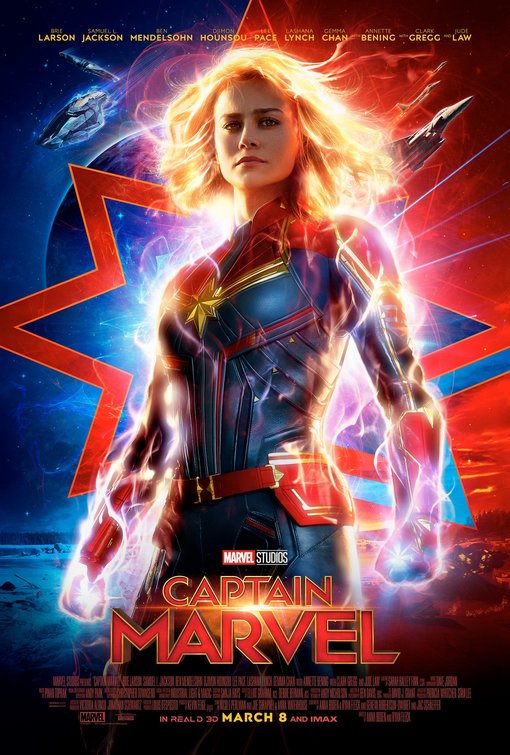Captain Marvel has emerged as the first true blockbuster of 2019, bursting out of the gate by earning $153 million during its first weekend. Audiences love the movie even though my own review was a bit more tepid.
While Captain Marvel is a very good action film, like several other critics, I thought the story didn’t hold together very well. Some reviewers believed a large part of the blame (from a film quality perspective) was in miscasting Brie Larson in the title role. I actually have a different take. I think the problem with the movie was in the story structure, which complicated the role of the actor and movie editing.
What I mean by story “structure” is the way the story unfolds, both in terms of plot and character development. While I won’t go into this in a lot of detail, movies have very rigid “rules” for developing screenplays and telling stories. Unlike novels, which can take their own course, screenplays have to fit into a highly structure two hour visual storytelling frame. The classic screenplay outline encompasses three acts. The first act gives us background of the character and the “normal” world where they are not faced with conflicts. This includes the inciting incident, that point that propels the character on their journey. The second act has the lead character(s) fumbling about until they realize they need to do something different (or die, often times literally). They will experiment with different strategies and tactics, but they are grounded in their “normal world” even though they are no longer living and acting the normal world. All this builds to a clamactic scene where the lead character overcomes their primary obstacle (or villain). The third act wraps everything up. The actual markers delineating the first, second, and third acts are not formulaic; They change with the character, plot, environment, and action.
Over the first and second acts, we (readers/audience) get to know the characters. We understand their world, their basic coping strategies, and the kinds of challenges that face on regular basis. We usually bond with the protagonist and identify the villain (or who we think is or will be the villain), so we have some sense of how the story will play out. This grounds us (the reader or viewer) in the personality and challenges we expect the character to face. (For more on this, see the classic books on screenwriting by Syd Field and Robert McKee, as well as Michael Tabb’s useful recent addition.)
Most stories are also paths on the so-called “hero’s journey.” They are on a quest for some higher purpose, and to achieve that objective they will face an almost insurmountable obstacle. The obstacle is “almost” insurmountable because if our protagonist doesn’t overcome it the ending is a downer. Most people like to see the protagonist win, even if they have deep flaws.
Which brings me to Captain Marvel….
We (the audience) are introduced to her through dreams, where we think she is human, but later realize she a member of the Kree civilization name Vers (pronounced Veers). Outside the dream, she is spunky, hot headed, and strong willed. In the dream, she has experienced a trauma and is confused and dazed. Which is the real Veers? Is it a dream? Or a memory? I don’t know, and without really understanding her starting point, I was confused. Moreover, we find out that the dreams themselves are connected to some vague Supreme Intelligence. So, they might be memories. Eventually, these two conflicting views of Vers are brought together, and its logical and makes sense. In the beginning, however, I (and surely other viewers) had to dismiss “one” of the Veers because her approach to situations was so diametrically opposed to each other. In the process, I was taken out of the story, and ended up focusing on the action, not the character. As a novelist who writes character driven action adventures, I was disappointed and unsatisfied.
From a artistic point of view, I think these dueling perceptions of the motivations and behavior of Vers unmoored her character in the story, making it difficult for readers and viewers to connect to her. Brie Larson clearly had a vision for her character, and how she would play it. The vision makes sense given the arc of the overall story. But as a viewer (reader if it’s a book), I couldn’t relate to her. I didn’t understand Vers’ motivations. Without understanding her motivations, I was unable to determine what her true challenge was, let alone evaluate the gravity of the obstacles she would face.
These confusions may have been the intent of the screenwriters and directors–there were multiple in both roles–a storytelling trick to keep us hooked. If this is the case, based on the criticisms of the film and Brie Larson’s performance coming from many different quarters of the critic community, I think they were too clever by half.
Personally, I saw a lot to like in Larson’s performance. If I had been more invested in her character and understand better how to interpret her behavior as she embarks, as most superheros do, on their journey toward self-discovery, I would have been all in from the beginning.
For the record, I really like the Captain Marvel character and think it’s long overdue for a female lead character to headline a Marvel movie. I am looking forward to seeing Brie Larson reprise her role in future films.
For those interested in movies with strong female characters, here are links to my reviews of Wonder Woman, a movie that I think gets everything just about right,
- Review of Wonder Woman
- 5 not so obvious things to love about Wonder Woman
- Wonder Woman Schools James Cameron on Strong Female Characters
More of my writing on storytelling from this blog can be found here.
